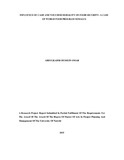| dc.description.abstract | The Strategic plan 2008–2011 expanded the role of WFP from food aid to food assistance,
introducing a more varied toolbox of responses, including cash and vouchers. This expansion
in the available resource transfer modalities is intended to ensure that responses can be
closely tailored to both the needs and the context of the people that WFP supports. Skeptics
however, fear that cash and voucher approaches are often impractical due to additional risks
of insecurity and corruption, and the fact that targeting cash may be more difficult than food
commodities. Even where they are feasible, there are concerns that it might be misused by
recipients, have negative effects on local economies and potentially fuel conflicts. The
purpose of the study was to establish the influence of cash and voucher modality on food
security a case of world food program Somalia. The study adopted a descriptive research
design and used a target population of 178 community administrators and management
employees of World Food Program in Somalia and Cooperating Partners (CP) implementing
the cash and voucher in Mogadishu. Stratified proportionate random sampling technique was
used to select the sample. From each stratum the study used simple random sampling to select
122 respondents. Data was collected using both open and closed ended questionnaires. The
quantitative data in this research was analyzed by descriptive statistics using statistical
package for social sciences (SPSS) version 2.1, a multivariate regression model was applied
to determine the relative importance of each of the five variables with respect to food
security. Content analysis was used in processing of qualitative data collected and results
presented in prose form. Quantitative data was presented in tables. The study found that
resources adequacy, targeting efficiency, communication strategy, delivery and
implementation and implementation medium on influence the cash and voucher modality on
cash and voucher modality on food security in Somalia to a great extent. The study therefore,
concludes that resources adequacy, targeting efficiency, communication strategy, delivery
and implementation and implementation medium influence the cash and voucher modality on
food security to a great extent. The study recommends that on targeting efficiency aspects;
the WFP should endeavor to take into cognizance and put in place set criteria – eligibility
criteria, recruiting competent staff and number of coordination meetings among agencies.
The study also recommends that WFP and other agencies should adopt complaint
management, internal quality control mechanisms and number of audits (processes, fiduciary)
for successful cash and voucher modality on food security in World Food Program Somalia. | en_US |



